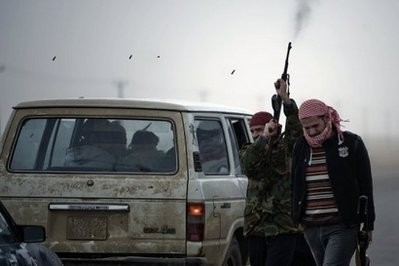BENGHAZI, Libya (AFP) – The Libyan opposition fighting to overthrow Moamer Kadhafi announced its first formal meeting on Saturday as regime loyalists fought a bloody rearguard action on two fronts.
The rebels hailed the capture of the key oil town of Raslanuf in deadly clashes on Friday while pro-Kadhafi forces moved in on the centre of Zawiyah, a city just 60 kilometres (40 miles) west of the capital that has been a stronghold of protest.

Up to 10 people were killed and more than 20 wounded in the clashes at Raslanuf, a pipeline hub on the Mediterranean coast that houses a major refinery and petrochemical complex, a doctor told AFP on Saturday.
The death toll from twin explosions at an arms dump in the rebel-held east of Libya meanwhile reached 27. The cause of the blasts remained unclear.
In Libya's second city Benghazi, headquarters of the rebel forces which control virtually the whole of the east, a spokesman for their self-declared national council said it was poised to hold its first session -- in secret for fear of assassination.
"The national council's first formal meeting is starting this morning," Mustafa Gheriani told AFP, but did not disclose a time or place.
"It's a safety issue. This guy (Kadhafi) still assassinates people."
Former justice minister Mustafa Abdel Jalil, one of the first high-proile Libyans to defect from Kadhafi's four-decade regime when the uprising began more than two weeks ago, has been appointed chairman of the 30-member body.
Rebels say they have set up local councils in cities they hold across the east and intend their transitional government to lead the country into an election, although Kadhafi is still firmly in control of the capital Tripoli.
The rebels expanded the area they control on Friday, attacking Raslanuf on the central coast, 200 kilometres (120 miles) east of Sirte, the Libyan strongman's hometown which remains in the hands of his loyalists.
Hundreds of jubilant rebels cheered and fired into the air late on Friday as they celebrated their capture of key positions in the town.
An AFP reporter saw rebels posted outside the Harouge Oil Operations compound, at the military barracks, police station and at the gates to a nearby residential area.
A hospital doctor treating rebel casualties from the fighting told AFP Saturday there were at least eight dead and 21 wounded.
"Two or three of them were moved to Benghazi hospital in a critical situation," Doctor Ahmad Burtima told AFP in the town of Ajdabiya, east of Raslanuf.
Some of the injured rebels being treated in Ajdabiya told AFP they had been heavily outnumbered and under-equipped compared to the loyalists.
"Kadhafi forces had heavy weapons. Most of the rebels just had Kalashnikovs. I was hit in the chest by an RPG. I lay on the roadside, then an ambulance took me to (the town of) Brega and then to Ajdabya," said Osama Ahmad, 28.
Another young man, Bashir, 30 from the de facto rebel capital Benghazi was shot in the chest.
"It happened while we were fighting one kilometre (less than a mile) from the airport. We were outnumbered by Kadhafi forces," he said.
More fierce fighting was reported Saturday in Zawiyah, a middle class dormitory town west of the capital where a number of key regime figures have homes.
Sky News correspondent Alex Crawford, reporting from the town, said people were sheltering in mosques as pro-Kadhafi forces battled the rebels for control.
"There is a lot of shelling by tanks and machine guns being used on the streets outside," Crawford said. "At least two of the attacking tanks have been destroyed and some troops have been captured."
"There are too many injuries for the doctors to cope with and there are reports that a hospital has been besieged," she added.
In Benghazi, Imad Talahma, a neurosurgeon at medical city, said the hospital had received eight dead and more than 20 injured from Friday's mystery blasts at the Rajma military base just outside the city.
Sources at Benghazi's other two main hospitals had earlier given a combined toll of 19 dead.
"We're not quite sure whether it was sabotage, an accident or an air strike, but nobody saw any planes," Gheriani, the rebel national council spokesman, said.
Oil prices soared again on the unrest. New York's light sweet crude for April delivery briefly topped $104 a barrel to the highest level for two and a half years.
The price could double if the situation in the Arab world deteriorates, British international development minister Alan Duncan warned on Saturday.
Duncan, a former oil trader with 30 years' business experience in the Gulf, told The Times newspaper that the price of a barrel of crude could top $200 (140 euros), well above the record high of $147 reached in July 2008.
"I've been saying in government for two months... $200 is on the cards if this goes wrong, if anyone is reckless and foments unrest.," he said.
With the protests spreading across the Arab world, threatening strategic US allies like Bahrain and Oman, the Wall Street Journal reported that Washington was moving towards a strategy of keeping regimes which are willing to reform in power.
Citing unnamed officials and diplomats, the newspaper said the administration was leaning toward this approach even if that means the full democratic demands of Arab citizens might have to wait.
























